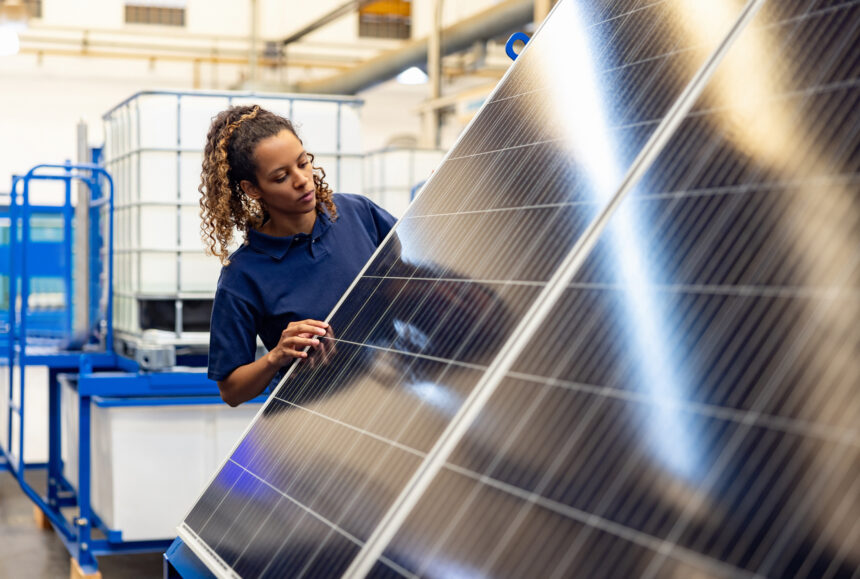
“America’s green energy future must be built with American workers across the entire supply chain,” Dave McCall, president of USW International, told the Commerce Department and the International Trade Committee.
The United Steelworkers (USW) union said on Tuesday Offered “strong support” Regarding antidumping and countervailing duty petitions filed by a major domestic solar power manufacturer with the Department of Commerce and the International Trade Commission.
of American Photovoltaic Manufacturers Association Trade Committee The committee, which seeks relief for alleged unfair trade practices by primarily Chinese companies operating in third countries, is made up of solar power companies with production facilities in the United States, including Convalt Energy, First Solar, Meyer Burger, Mission Solar, Q Cells, REC Silicon and Swift Solar.
Solar manufacturers allege that Chinese companies have set up factories in Cambodia, Malaysia, Thailand and Vietnam to evade past U.S. trade enforcement actions. These companies are also accused of benefiting from heavy government subsidies, leading to solar overproduction and the dumping of solar products into the U.S. market at unfairly low prices.
USW International President Dave McCall said: Letter of August 27th The letter, addressed to Commerce Secretary Gina Raimondo and International Trade Commission Chairman Amy Karpel, called for “careful consideration of the petition” submitted by solar manufacturers.
“The modus operandi of the (People’s Republic of China) illegal trade practices is no secret: subsidize, create excess capacity, pay low wages, dump, and operate in low-wage countries to circumvent and gain access to international markets. China has done this in a variety of industries, including steel, tires, chemicals, paper products, aluminum extrusion, and solar power, for nearly 25 years since the United States granted it permanent normal trade relations status. In recent years, the Chinese Communist Party has designated the “New Three” strategic industries to monopolize, which include electric vehicles (EVs), lithium-ion batteries, and the solar power supply chain. Not only are China-based companies building facilities in neighboring countries to circumvent U.S. trade laws, they currently produce 90% of the world’s solar-grade polysilicon and nearly 100% of the wafers used to supply those facilities. This allows China’s state plan to dominate the global solar power supply chain at the expense of U.S. companies and workers.”
Department of Commerce Decided in 2023 Solar cells and modules from China were being shipped through Cambodia, Thailand, Malaysia and Vietnam to evade U.S. trade enforcement, but the Biden Administration’s two-year moratorium on solar tariffs meant no tariffs were imposed on these unfairly traded imports.
The moratorium technically ended in June 2024, but companies in previous trade cases had time to transition their supply chains until they were no longer technically in violation. According to The ongoing trade petitions against solar manufacturers are necessary to address the unfair trade practices being perpetrated by Chinese companies in these four countries and finally provide real relief.
There is a lot at stake. China currently dominates the solar industry and its supply chain. Over 80% of the world’s solar power production capacity — and by using unfair practices such as: Possible forced laborto keep it that way. But with the passage of the Inflation Control Act, the United States has begun to take real steps to rebuild its own solar manufacturing capacity. Leading to a significant increase in domestic investment.
But all of that would be for naught if China could set up shop in or ship products through the four Southeast Asian countries named in the lawsuit, allowing it to export exploitative goods to the United States at cheap prices.
Of course, this is a direct threat to the solar companies that filed the lawsuits, but as McCall points out in his letter, the USW represents workers throughout the solar supply chain whose jobs are also at risk.
“The United States currently employs more than 30,000 workers in the solar supply chain, but with a fair and equal international solar market, that number could grow to hundreds of thousands,” McCall wrote.
“China’s dominance of the global solar supply chain through unfair and illegal operations funded and supported by the Chinese Communist Party creates significant economic, defense and energy security risks for the United States and other countries. American companies led by the Allied Trade Committee and American workers represented by the USW deserve to compete on a level playing field. America’s green energy future must be built by American workers and American innovation across the solar supply chain, and it is vital that Allied Trade Committee U.S. manufacturers build large-scale factories to compete with China-based companies.”







